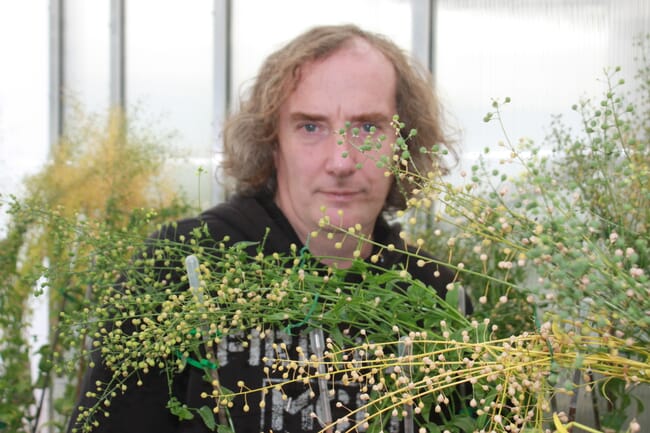The research is jointly led by plant scientist Professor Jonathan Napier, from Rothamsted Research – who is the driving force behind a project that produced GM camelina with high levels of the key fatty acids DHA and EPA – and fish nutritionist Professor Douglas Tocher, from Stirling’s Institute of Aquaculture.

© Rob Fletcher
“The joint project allows us to culture salmon to market size in sea pens while extracting data to ensure new feeds support good growth, feed use and product quality,” Professor Tocher said.
Professor Napier added: “This is the largest feeding trial to validate the efficacy of the project. It’s extremely significant because it will demonstrate the ability to use omega-3 fish oils from plants across the whole production cycle of salmon.”
The study, which is funded by the Biotechnology and Biological Sciences Research Council (BBSRC), will see the farmed fish being given a feed which includes oils pressed from GM Camelina sativa, instead of the fish oils traditionally used to ensure the salmon contain high levels of omega-3s, which are vital for both aquaculture feeds and human health products. In theory such transgenic strains could take the pressure off fish oil supplies, which mainly come from wild-caught oily fish – a finite resource.
Prof Napier, who has been working with transgenic camelina for over a decade previously observed that if roughly 1 million hectares of the strain were cultivated, it would be sufficient to satisfy the global salmon industry's demand for omega-3's.
“It’s taken a decade to develop plants able to produce the oils and be used in aquaculture,” he said.
“This GM technology shows great promise as a potential solution to help fish farming remain even more sustainable while continuing to grow as an industry.”
During the course of the trial, Dr Monica Betancor, a research fellow at Stirling, will play a crucial role by checking on the health of the fish and collecting data.
“Collecting samples and analysing the data are imperative to the project. To test the performance of the fish, I’ll be measuring the weight and growth of the fish, but also looking at tissue and molecular samples comparing results of fish fed the new fish feed to salmon fed a standard diet,” said Dr Betancor.
The project will both serve as a proof of concept and a potential solution to the sustainability issue in supplying fish oils to farmed fish.



